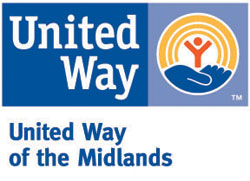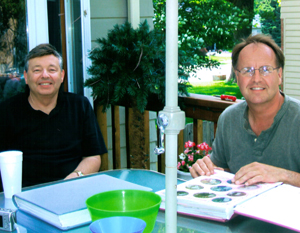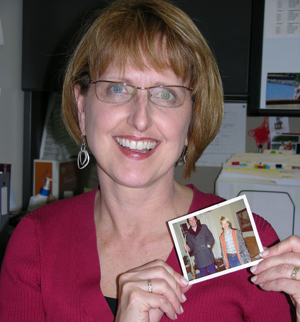 Robin Taylor loves the Big Brothers Big Sisters organization and donates money to it every year during the United Way campaign.
Robin Taylor loves the Big Brothers Big Sisters organization and donates money to it every year during the United Way campaign.
“It helped save my family,” she said.
Taylor, project coordinator for the department of pharmacology and experimental neuroscience, said the saving wasn’t a dramatic, one-time event, but something that happened over the course of the past 35 years.
It started with the traumatic death of her father in 1973 that left a void for her then 12-year-old brother, Jeff Micek.
 |
Bill Meredith and Jeff Micek. Meredith mentored Micek — brother of UNMC’s Robin Taylor — through the Big Brothers and Big Sisters Program. |
 |
Robin Taylor holds a picture of Micek and Meredith from the 1970s. |
It was an overwhelming proposition for the adolescent, who had three older sisters and one younger. Growing up in midtown Omaha, Jeff described himself as being “out of control.” An unfriendly neighbor suggested that his mother place him in Boys Town. He desperately needed a male role model.
That’s when a public service message on television for Big Brothers caught the attention of Jeff and his mother. He asked if he could have one.
They went to see Bill Meredith, who in his mid- to late-20s, was leading the organization. After the initial interview, Meredith decided to be Jeff’s big brother.
“It was a total mismatch,” said Taylor, Jeff’s older sister by seven years. “Jeff loves the outdoors and Bill doesn’t, but Bill did everything with Jeff. He went camping and took Jeff on his first pheasant hunt. Bill refused to hold a gun until he was teased into carrying one — it wasn’t loaded.
“Whatever Jeff wanted to do, Bill made sure Jeff could do it,” Taylor said. “They went bowling and swimming together. Bill taught him to drive.”
Meredith, who holds a doctorate degree and is now director and professor of the School of Family Studies and Human Services at Kansas State University in Manhattan, Kan., said that he enjoyed seeing Jeff have so much fun.
“That, in itself, made it fun for me. Jeff remembers that when he takes his youngest son to football games,” Meredith said. “Jeff was more than a little brother through a big brother program — he also became a very good friend.”
That relationship forged years ago had lasting effects on Jeff and the family, Taylor said.
“It’s because of Bill that Jeff now volunteers and works with kids. It’s his way of giving back everything Bill did for him — he’s passing it on,” she said.
Micek has been a volunteer bowhunter education instructor for the Nebraska Game and Parks Commision for nine years and recently was asked to be a master instructor to recruit and train new instructors.
He has been a mentor with the Nebraska Game and Parks Commissions Youth Archery Deer Hunting program for the past seven years. He also is active as a member of the Nebraska Chapter of the Ted Nugent United Sportsman, which hosts such activities as a one day Kamp For Kids, that teaches archery, air rifle, fishing, trapping and other outdoor activities.
Micek, 48, is married and has passed his enthusiasm for the outdoors on to his three sons.
|
Taylor, managing editor of the 120-page Journal of Neuroimmune Pharmacology, a quarterly journal started at UNMC in 2006, remembers her brother sharing a letter Meredith wrote to him before he went to college.
The letter told him that he could do anything he wanted in life and identified some struggles Micek was facing. Meredith warned that if Micek continued down that path, life would just get harder.
Meredith’s words helped Micek make a life change. When Micek reread the letter 20 years later, he understood how insightful his mentor was, Taylor said.
“I don’t know what would have happened to us or Jeff if Bill hadn’t come into our lives. He had a calming effect on all of us,” she said. “It’s a wonderful program for children and families that are struggling.”
Big Brothers Big Sisters is one of the 1,300 organizations that receive money through the United Way national fundraising campaign. UNMC’s goal this year is to raise $140,000.
“The big brother relationship was the best experience of Jeff’s life and continues to this day,” Taylor said.
Micek was a groomsman in Meredith’s wedding and the two families often visit each other.
“Bill was like a big brother to my family,” she said. “I believe dad put Bill in our lives — he’s watched over us through everything.”